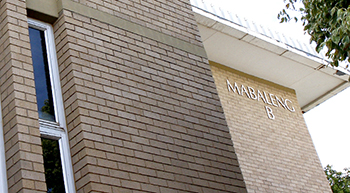
SAHRC situated in the Mabaleng building,
Bloemfontein Campus
Photo: Hannes Pieterse
After approval by the Rectorate, Senate and Council of the University of the Free State (UFS), the Free State Centre for Human Rights (FSCHR) began operations on 1 January 2016 on the Bloemfontein Campus, under the leadership of Prof Leon Wessels, founding member of the South African Human Rights Commission (SAHRC) as the Acting Director of the centre.
Human rights remain, undoubtedly, the dominant moral and political language of our times and thus demands multi-layered scholarly engagement as it influences national and international relations, and sets standards for political and democratic practice.
Establishment of centre fulfilment of court order
Top on the centre’s agenda will be to resolve the debate with the SAHRC relating to the February 2011 post-Reitz agreement of the UFS, which was subsequently made an order of the Equality Court. This order compelled the UFS to establish such a centre. The FSCHR presents new opportunities for cooperation between the FSCHR, the SAHRC and other stakeholders to the benefit of the UFS and the broader community.
Three divisions of the centre to achieve its mandate
The centre consists of three inter-related divisions with the potential to stimulate critical scholarship in the field of human rights through its postgraduate and research division. This is reflected in the centre’s mission to deepen the study of human rights and further its praxes by developing novel methodologies in which traditional human rights issues can be complemented by interdisciplinary and multi-disciplinary approaches.
The Advocacy division of the centre will promote human rights among UFS staff and students, and the surrounding community. The aim is to establish a vibrant human rights culture in and across all campuses in which rights of all are respected and protected.
The Legal Services division will provide trustworthy legal services to individuals and groups whose fundamental rights have been abused, to improve the professional capacity of paralegals, students, counsellors, social workers, candidate attorneys and attorneys, equipping them to deal with cases of infringement of constitutional and human rights and to increase access to justice to rural and indigent communities in the Free State.
Centre key in positioning UFS as a regional leader in human rights issues
The centre, with its inter- and multi-disciplinary approach, has the potential to become one of the flagship projects of the UFS, and will strengthen both the Academic and Human Projects. A UFS human rights centre not only makes sound scholarly and practical sense, it also has limitless symbolic value. The location of one of UFS’s campuses within the city of Bloemfontein (the judicial capital of South Africa) and having partnered with the National University of Lesotho (NUL), is historically and geographically significant. This has a great impact on the UFS, the Free State province as a whole, and the Kingdom of Lesotho.
The FSCHR will be officially launched on 14 March 2017 with Professor Bongani Majola, newly elected chairperson of the SAHRC, as guest speaker.
For further information on the work of the centre, please contact FSCHR@ufs.ac.za / +27 51 401 7216.